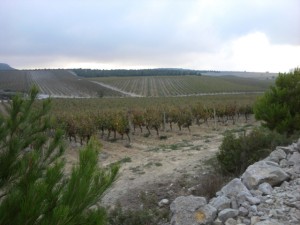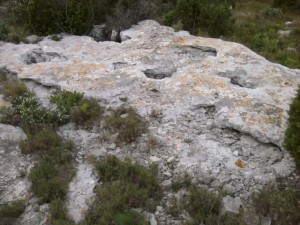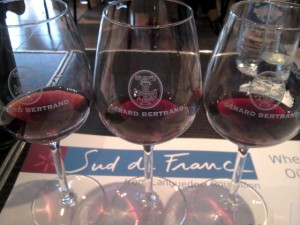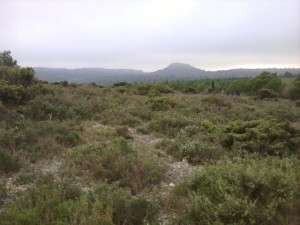[caption id="attachment_380" align="alignright" width="300"] Vines of Château L'Hospitalet.[/caption]
Vines of Château L'Hospitalet.[/caption]
At the end of last week, as announced, I attended the "Sud de France Master Class": the two-day intensive seminar that the French Wine Society and Sud de France developed together to impart both compact and detailed knowledge about the wines of Languedoc-Roussillon. That is a high demand - but it was fulfilled; especially as I was lucky enough to attend the seminar directly in the region, at Château L'Hospitalet near Narbonne.
[caption id="attachment_381" align="alignleft" width="300"] The soil in La Clape is stony and calcareous.[/caption]
The soil in La Clape is stony and calcareous.[/caption]
The estate of Gérard Bertrand - formerly a rugby player, now an entrepreneur with eight wineries in Languedoc-Roussillon - is surrounded by vines, it smells of herbs, flowers and salt, and from a hill on the grounds you can even see the Mediterranean Sea. The stony, chalky soil of the La Clape appellation, where the winery and hotel are located, is clearly visible everywhere: terroir you can touch! The wind, which shapes the area and influences the vegetation, also blew strongly during the three days I was there.
In Toulouse at the airport the evening before, I met another seminar participant who runs a Jacques' wine depot in Stuttgart. During the journey towards Narbonne, we passed through the Limoux and Corbières appellations, so that we were able to practically apply and check the knowledge we had read in the seminar manual sent to us in advance.
[caption id="attachment_378" align="alignright" width="225"] Almost ready to go: the seminar room is prepared[/caption]
Our seminar group consisted of 14 participants, whereby the ladies were in the majority. They came from the wine trade, wine tourism, wine marketing, wine journalism as well as from consulting and further education. In terms of nationalities, France, Germany, Great Britain, the Netherlands, Spain and even Taiwan were represented. The language of instruction was English, but most spoke French, so we switched between both languages especially during the breaks. Already at lunch on the first day, most of us were on a first-name basis with each other - so the mood was good.
Our friendly seminar leader Matthew Stubbs, Master of Wine, comes from England himself and, after a career in the international wine trade, founded a wine school near Limoux out of enthusiasm for the Languedoc-Roussillon region: the Vinécole. The content of the two-day programme mirrored the 120 or so pages of the handbook. After a par force ride through the history (6000 years in one hour), geography, geology and climate of the region, we got to know and assess the individual terroirs of almost all of the 50 or so appellations of Languedoc-Roussillon using practical examples, tasting and discussing over 50 white, red, sparkling and sweet wines. I hardly believed beforehand that it would work like that, but it did and was extremely educational and entertaining. Matthew lectured and explained everything as vividly as he did stimulatingly with a lot of expertise and passion - that's what makes further education fun!
[caption id="attachment_382" align="alignright" width="300"] During the rehearsal: over 25 wines a day are work![/caption]
During the rehearsal: over 25 wines a day are work![/caption]
On the evening of the first day, eight of us went out to eat together in the hotel restaurant - but this turned into a bit of a challenge. Most of us had booked independently for two or three people, but the fact that we all wanted to sit together at one big table presented the service and apparently especially the kitchen - incomprehensibly for us - with a considerable problem. The (apparently very stubborn and domineering) chef told us that he was not prepared for a "group" and that we could only have two courses: Starter and main or main and dessert. And for these courses, following his suggestion, we were to choose the same thing if possible; a free choice from the menu was not offered. We only complied to a certain extent, but when we were also asked to book each course individually for each hotel room, the chaos was perfect: the waiter (who was rather unfortunate and left alone by any superiors) came about six times to assign the dishes and kept asking for the room number for each dish - and in the end the bill was not correct. When we told the Sud de France representative about this experience the next morning, she immediately contacted the hotel management, and during the lunch break, the PR director personally apologised to all those "affected", and the entire restaurant consumption of the evening was removed from the bill. We had not expected or asked for this at all, especially as we had largely taken the turbulence with humour and still had a very good time and laughed a lot. With this generous overcompensation, L'Hospitalet then redeemed itself.
[caption id="attachment_383" align="alignright" width="300"] The rugged landscape is characterised by the garrigue: low bushes that defy the strong wind and thrive on the barren soil.[/caption]
The rugged landscape is characterised by the garrigue: low bushes that defy the strong wind and thrive on the barren soil.[/caption]
Half of our group took the voluntary final exam at the end of the second day. The exam consisted of answering 50 multiple-choice questions, four written answers and a map exercise in which individual appellations, cities or rivers had to be assigned - demanding, but absolutely fair (as long as one has conscientiously worked through the seminar manual beforehand). We get the results in six to eight weeks.
The next day, I drove to the seaside in Gruissan, visited the church and the castle and took a stroll through the market. On the way back to Toulouse, I could immediately recognise the change in vegetation between La Clape and Corbières - the first success of the seminar. In this respect, the "Sud de France Master Class" was an enriching experience: professionally (because of the knowledge gained), humanly (because of the nice new contacts) and atmospherically, because southern France with its varied landscape and culinary delights is always worth a trip.